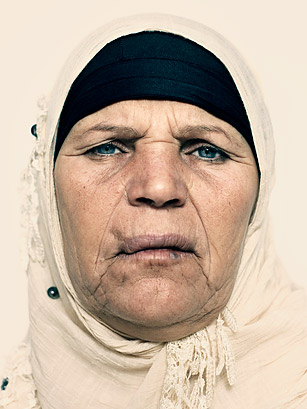
(2 of 3)
Did you hear any particularly memorable words, anything you heard that has stuck with you, that was memorable?
With regard to words, it was the first time that people all felt affected. They all wanted to speak, to participate, to respond to what happened to Mohammad. He became like a a light. He was the last drop that overfilled the cup. It was a situation that nobody could imagine, nobody could fathom. The soul is precious. For a person to set themselves on fire, all because of oppression and humiliation.
In this past year you have met many people, from international figures like U.N. Secretary General Ban Ki-moon to regular people from other towns in Tunisia and around the region. Did anybody tell you something that stuck with you more than anything else?
Their words, all their words, touched me. I was in mourning. He was a young man who hoped for good things, who asked for his mother's blessing, who wanted to work and to help his family, but as the days went on, the talk increased, the attempt to smear us started, talk that Ban Ki-moon gave us money, that I ask journalists for 5 million [dinars] an interview. That's not true. I have never been paid for an interview or by Ban Ki-moon or by the government of America or France or anyone else. Even the Tunisian government didn't honor us or give us anything more than the 20 million for every martyr.
I was surprised by many things, some good and others bad. Many people were very patient with him. They helped me to get through this. They would tell me that Mohammad, may God rest his soul, died a martyr. They showed me affection, kindness. I was treated well by them. I went to New York, to Doha, to Paris. I traveled to a lot of countries that honored me and my son, that showed great kindness, much love, respect, as well as in Sidi Bouzid and in Tunis. But there are other people, some say it is because of jealousy and ill-will, who are smearing us. A lot of people have told me not to listen to these others. They try to cheer me up, to lessen my sadness. But some people are gossips, jealous, mean.
The ugliest thing I have experienced since Mohammad's death is when I returned to my home recently, the home of the deceased, the home that he lived in for 27 years and left, that Hania Dawi [her neighbor] made us so uncomfortable that we couldn't stay there. We left early on Wednesday to return to Tunis. My daughter had stepped outside to take out some rubbish. She hit her, pulled her hair. My daughter screamed, "Mama, Mama, help me." I swear to God I didn't even realize my daughter wasn't in the house. I went outside. That's when the neighbor grabbed a large rock and hit me on the head. My head started to bleed. She kept hitting me.
What did you do with Mohammad's things? Is there an item you value more than others?
That night, the night that woman did that to us, on that night, the deceased's sisters and I had spread out his clothes, and sprayed them with his cologne to smell him again. Basma and Samia [two of her daughters] took out his clothes from the cupboard and sprayed them. Leila [his other sister] had stepped out to throw the rubbish and that's when she started screaming out to me to come and help her. [His mother goes into the other room and comes back with a short-sleeved white shirt that says "Flyboys" on it and a half-empty bottle of cologne. She smells his shirt and starts to cry.] He used to love this smell.
Could you have imagined that your son's actions would have the effect they did? That he has become a symbol, not just in Tunisia but around the world?
From when he fled from his oppressor, I knew he was going to emerge as a symbol, because nobody accepted that our oppressor, that dog, would flee this country. We thought only death would take him from us.